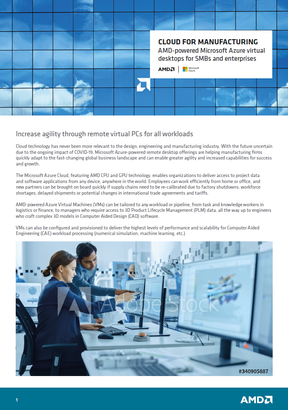In these unprecedented times many firms are re-evaluating their IT strategies in the global manufacturing industry. With an increase in home working and uncertainty about the future, more businesses are seeking greater agility through flexible cloud services like Microsoft Azure.
Of course, manufacturing firms don’t have to go all-in with cloud. Those with existing on-premise datacenters often prefer a hybrid cloud approach to protect their IT investment, while also benefitting from increased flexibility.
More so than most other businesses, manufacturing firms have a very diverse set of desktop/PC resource requirements for their staff. The good news is, AMD CPU and GPU-powered Microsoft Azure Virtual Machine (VMs) can be tailored to any workload or pipeline, from product designers (NVv4) and specialists in engineering simulation (HBv2), to task and knowledge workers (D and E series).
Even within this latter group the requirements can vary greatly, from call-center analysts, warehouse staff and assembly line workers, to accountants, sales managers, supply chain managers, human resources, and research analysts.
For the lighter workloads – those that are typically not CPU- or memory-intensive – the Microsoft Azure Dav4-Series offers a very attractive solution. The D4as_v4 instance in particular offers a great combination of vCPU (4), memory (16 GiB), and temporary storage (32 GiB) at a very competitive price point. For more demanding workloads, D8as_v4 will give you double of everything.
Importantly, firms may enable significant cost savings by allowing the resources of a single instance to be shared by multiple users through a sessions-based virtual desktop. And, as you’d expect from Microsoft, Windows 10 Enterprise multi-session (formerly known as Windows 10 Enterprise for Virtual Desktops (EVD)) is fully supported on Azure.
While many manufacturing ‘task worker’ workflows tend to have moderate CPU requirements, and little to no need for a GPU, the applications used by ‘knowledge workers’ are changing. For a modern desktop experience, common office productivity tools, such as Microsoft PowerPoint, as well as web browsers, increasingly need GPU acceleration for the best user experience when viewing or authoring 3D content. Furthermore, those in product marketing or product management are increasingly working directly with 3D models.
This is where the GPU-accelerated family of Microsoft Azure NVv4 VMs comes into play. Available in four different sizes with 1/8, 1/4, 1/2 or a full GPU, they can be adapted to GPU workloads with different intensities. And like the Dav4-Series, they can be shared by multiple users through a sessions-based virtual desktop.
Indeed, unlike a designer or engineer that ideally needs a dedicated resource to run GPU intensive applications like CAD, knowledge workers tend to have a more sporadic need for GPU acceleration, which lends itself well to sharing. A sessions-based approach with NVv4 could even extend to more demanding users, such as those generating real time 3D content or managing the product development process through a Product Lifecycle Management (PLM) system. It’s all about finding the right balance between experience and cost.
Cloud for Manufacturing – Brief
Read our complete guide to Azure Cloud for Manufacturing - which details the specific scenarios, workloads, benefits and recommendations for deploying your IT infrastructure into the Cloud.
azure-mcad-solution-brief-v9-final.pdf (amd.com)

For more resources:
- NVv4 Microsoft GA blog: Link
- NVv4 pricing: Link
- AMD.com/Nvv4: Link
- NVv4 for Design and Manufacturing: Link
Sean Kerr is a Product Marketing Manager for AMD. His postings are his own opinions and may not represent AMD’s positions, strategies or opinions. Links to third party sites are provided for convenience and unless explicitly stated, AMD is not responsible for the contents of such linked sites and no endorsement is implied.